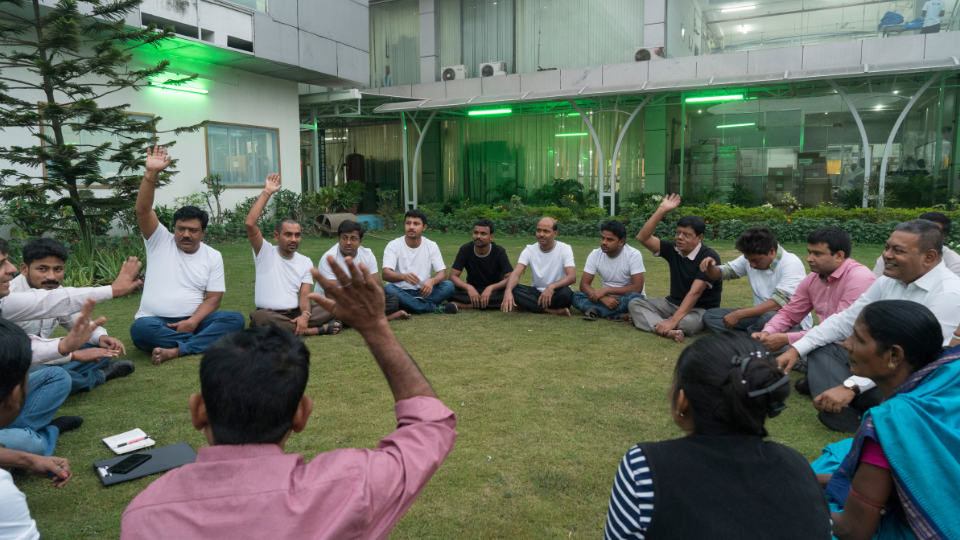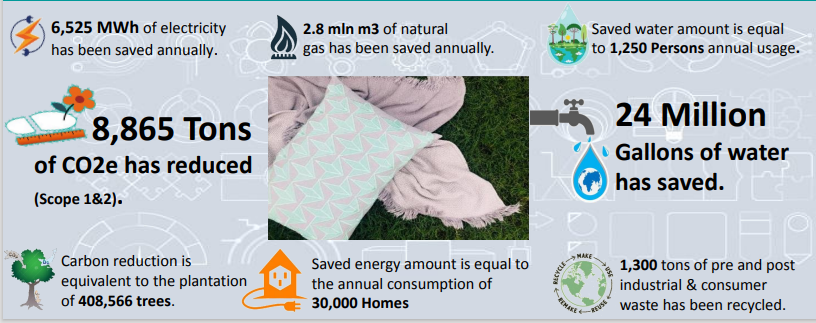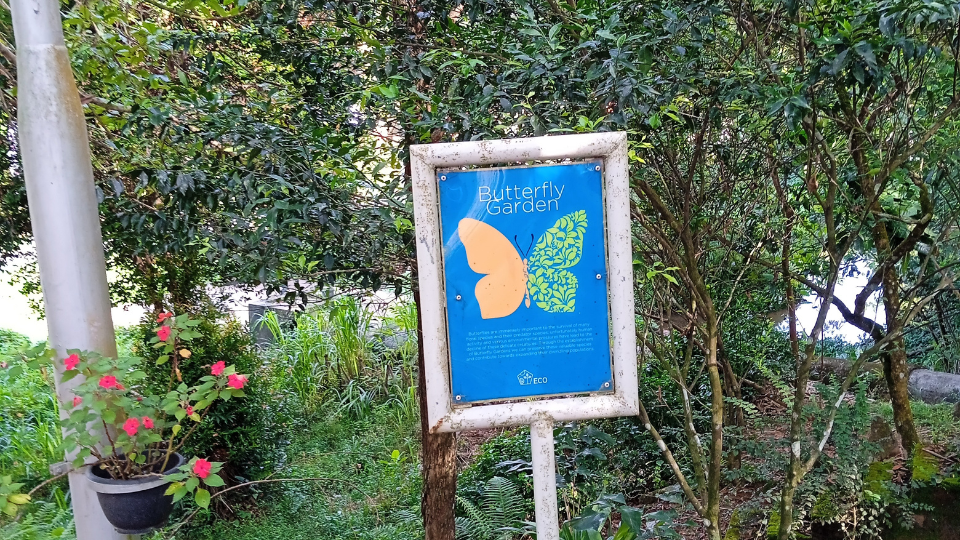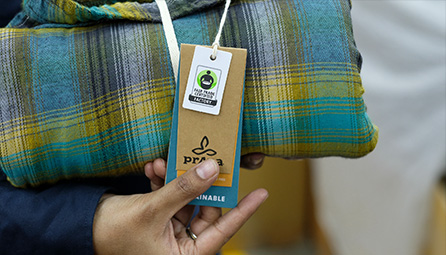From textile firms in Pakistan to apparel manufacturers in Sri Lanka, workers at Fair Trade Certified facilities around the world are demonstrating an inspiring commitment to sustainable and eco-friendly practices.
The production of our everyday goods can have significant environmental impacts like deforestation, soil erosion, pollution, biodiversity loss, and more. This threatens the long-term viability of production systems and the livelihoods of entire communities. Humans depend on a healthy planet to survive, and our planet’s wellbeing relies on our commitment to protect it. This interdependent relationship makes it clear: if the environment suffers, so do we.
By embracing the connection between planet and people, we believe it’s possible to preserve the delicate balance of our interconnected world and achieve a more sustainable future. While the Fair Trade Certified program is widely known for its social and economic impacts, like safe working conditions and increased incomes, it also addresses environmental sustainability. Fair Trade USA™ works alongside a vast network of partners to take a holistic approach to sustainable development, one that centers all three pillars of sustainability – social, environmental, and economic. We celebrate our partners’ sustainability commitment, and frequently witness them going above and beyond to meet additional environmental goals.

Members of the Fair Trade Committee at Rajlakshmi Cotton Mills, a Fair Trade Certified facility in Howrah, West Bengal, India, meet outdoors in the courtyard garden.
Communities Investing in Environmental Solutions
Fair Trade USA™ standards focus first and foremost on preventing and reducing harm to the environment from production activities. For instance, our standards for agriculture and seafood include requirements around preserving eco-systems, limiting the use of harmful chemicals like pesticides, and prohibiting deforestation. Likewise, standards for Fair Trade Certified manufacturing facilities (outlined in our Factory Production Standard), include environmental measures, like establishing an Environmental Management System and responsibly managing the storage, use, and disposal of chemicals and waste.
Beyond standards, the Fair Trade Certified program also strives to ensure people have the capacity, knowledge, and Community Development Funds to produce sustainably and safeguard their own natural environment. It’s important to remember challenges faced by local communities and the appropriate solutions are contextual. When communities are empowered, they can put their lived experience into action and be brilliant problem-solvers, investing in eco-friendly practices and solutions.
As an example, Fair Trade Certified factories regularly demonstrate a genuine passion for protecting the planet. We spoke to sustainability managers in several countries to learn what certified factories are doing to manage their environmental impacts.
Here’s a round-up of three favorite environmentally friendly factory projects!
1. Combatting Carbon Emissions at Al-Karam Textile Mills
Al-Karam Textile Mills is one of the largest textile manufacturing and exporting firms in Pakistan and has adhered to Fair Trade standards for more than six years, impacting over 900 workers. Of the 5,800 tons of fabric produced by Al-Karam annually, 40% is produced on Fair Trade terms.
The company has implemented many eco-friendly projects, such as installing solar panels and efficient lighting. Al-Karam aligns its social and environmental performance with the United Nations Sustainable Development Goals, aiming for net zero carbon emissions by 2050 and 80% water recycling. Beyond energy and water initiatives, the company also strives to use organic chemicals, which protect the ecosystem surrounding the factory. Al-Karam has also implemented end-to-end measures in the production process to reduce material use and incorporate recycled materials in textile products.

Sustainability efforts at Al-Karam, a Fair Trade Certified factory (represents data shared in 2023).
2. Forging a Sustainable Future at CKT Apparel
CKT Apparel is a cutting, sewing, and finishing facility for one of Sri Lanka’s leading apparel exporters. About 26% of its annual production is done on Fair Trade terms, benefiting over 2,300 workers. The facility holds LEED green building certification and utilizes the Higg Index to measure and improve social and environmental performance. CKT installed solar panels on the roof of the factory to power its activities, and it has a rainwater collection system to reduce reliance on the municipal water supply. CKT has been achieving carbon neutrality for a decade and is working toward achieving zero waste and complete material circularity.
In addition to these environmentally friendly factory initiatives, workers at CKT have established biodiversity projects to preserve the surrounding forest area that includes land for organic gardening and a butterfly habitat!

CKT Apparel’s budding butterfly habitat

Butterfly pupae suspended from trees in the habitat
3. Redefining Sustainability at Artistic Milliners
Artistic Milliners – a denim manufacturer in Pakistan – is well-known for its focus on innovation and sustainability. The company has three certified factories, impacting about 7,300 workers, one of the largest groups of workers in the Fair Trade Certified factory program.
Of the fabric produced in Artistic Milliners factories, 25% is sold on Fair Trade terms. Utilizing the Recycled Claim Standard and Organic Cotton Standard ensures recycled or organic material usage. The company has implemented solar panels, recycles 80% of its water, and is working on eliminating waste discharge. Artistic Milliners tracks its energy consumption, carbon footprint, and water usage. The facilities also employ heat recovery technology to maximize energy efficiency.
Note: The project updates and sourcing data included in this article reflect the latest information as of 2023.
Uniting Planet & People Through Sustainable Practices
Against the backdrop of a world grappling with the challenges of climate change and social inequality, these remarkable eco-friendly projects illuminate the journey towards sustainability as a collective endeavor that transcends borders and industries.

As a consumer, you may be wondering: what can I do to support responsible sourcing practices at factories? Here are some ways to champion Fair Trade practices:
- Choose to shop items with the Fair Trade Certified label. It’s one way to ensure your dollars do more for the planet and people.
- Elevate your commitment to being a conscious consumer by signing a pledge to purchase with purpose today!
- Connect with our consumer community.
Fair Trade for Business
Are you a business interested in certifying your existing factories or sourcing from more than 100+ Fair Trade Certified factories around the world? Learn more about our factory program and get started on your Fair Trade journey!